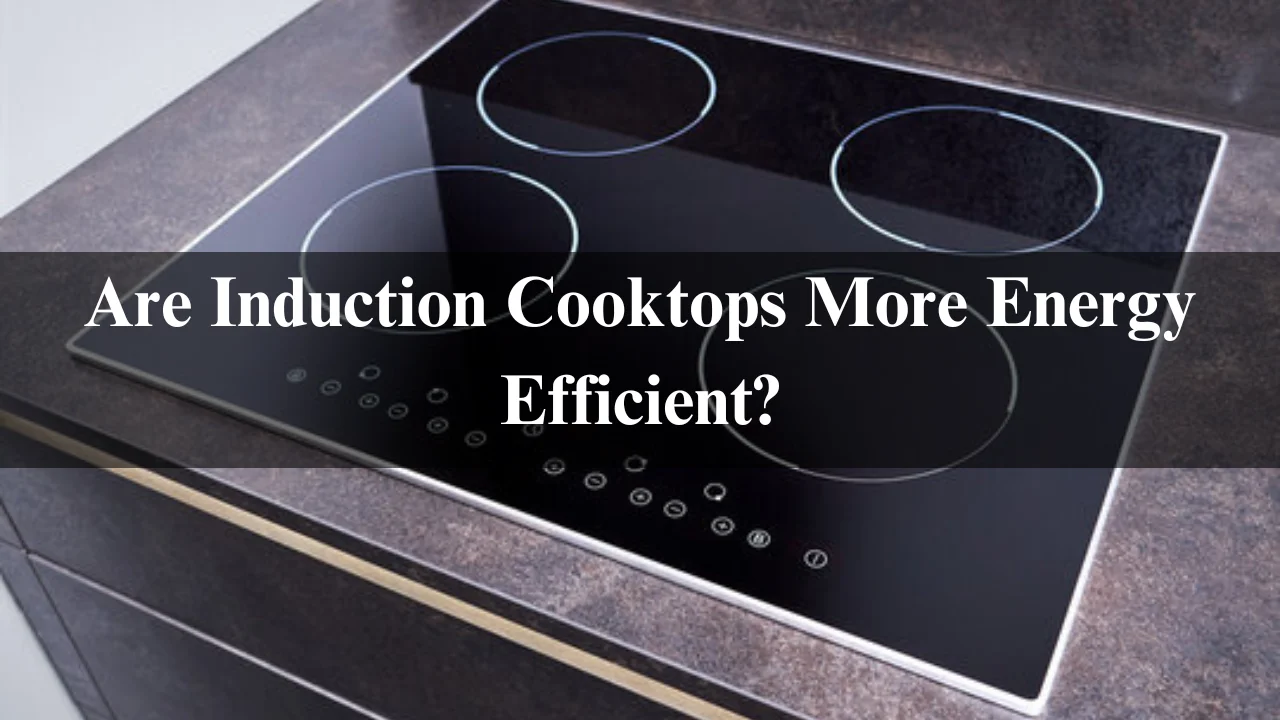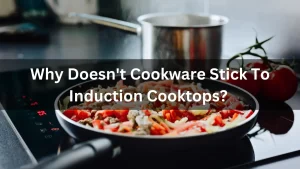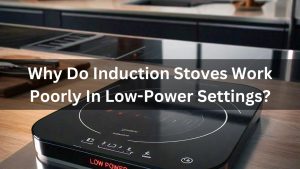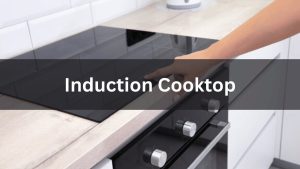Are you ready to revolutionise your cooking experience? If you’ve ever found yourself frustrated with long wait times for pots to heat up or wondering how much energy efficient your induction cooktops might be the answer.
These sleek appliances are modern and stylish and promise a more efficient way of preparing meals. As we delve into induction cooking, you’ll discover what sets these cooktops apart from traditional methods and why they could be the key to a more sustainable kitchen. Let’s explore this innovative technology together!
Table of Contents
What Are Induction Cooktops?
Induction cooktops are a modern kitchen marvel designed for efficiency and precision. Unlike traditional gas or electric stoves, they use electromagnetic fields to heat pots and pans directly. This means the cooktop surface stays cool while your cookware gets hot.
Crafted from smooth glass-ceramic materials, induction cooktops bring an elegant touch to any kitchen. Their sleek design makes them easy to clean—just wipe down after cooking.
One of the standout features is their rapid heating capability. Compared to conventional methods, water boils almost instantly. Many models have smart technology, allowing you to control settings remotely.
Safety is another significant advantage; induction cooktops only activate when compatible cookware is placed on them. This minimises risks like burns or accidental fires, making them ideal for busy households.
How Do Induction Cooktops Work?
Induction cooktops operate on a fascinating principle of electromagnetism. Placing a pot or pan on the cooktop triggers an electromagnetic field beneath the surface.
This field generates heat directly in the cookware rather than heating the stovetop. As a result, cooking is quicker and more efficient because heat is concentrated where it’s needed most.
Moreover, induction cooking requires compatible ferrous metal pots and pans responding to this magnetic energy. When you lift your cookware off the surface, the heat ceases almost instantly.
This technology speeds up meal preparation and enhances safety. The cooktop remains cool to the touch around the cookware area, minimising burn risks for anyone nearby.
Why Is Energy Efficiency Important in Cooking?
Energy efficiency in cooking has significant implications for the environment and your wallet. Reducing energy consumption translates to lower utility bills, which is always a plus.
When you opt for energy-efficient cooking methods or appliances, you also decrease your carbon footprint. Every bit helps combat climate change and promote sustainability.
Moreover, efficient cooking means quicker meal preparation. Less time spent on heating can lead to faster dinners without sacrificing quality or flavour.
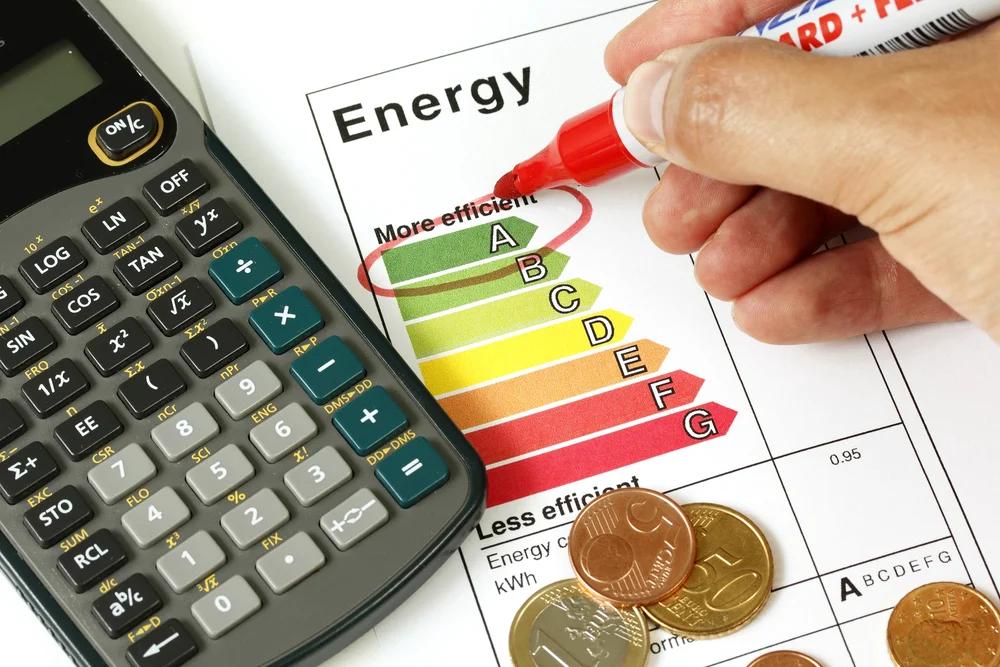
With rising energy costs, making smart choices becomes essential. Energy-efficient cooktops not only save money but often deliver enhanced performance too.
Being mindful of how we cook encourages innovation and better habits in our kitchens, which in turn contributes positively to the planet’s health.
Induction Cooking vs. Traditional Methods: A brief overview about energy efficiency
A few key differences stand out when comparing induction cooking to traditional methods. Induction cooktops use electromagnetic energy to heat cookware directly, while gas and electric stoves rely on flames or heating elements that warm the stove’s surface. This direct transfer of power in induction cooking not only heats up and pans more quickly but also reduces wasted heat.
Energy efficiency is another pivotal factor. Traditional stoves often lose significant amounts of heat into the surrounding air, making them less efficient for cooking tasks. In contrast, induction cooktops deliver around 90% of their energy directly to cooked food. This means faster preparation times and potentially lower utility bills.
Safety features are also worth noting. Induction surfaces remain cooler than those on traditional stovetops since they only generate heat when compatible cookware is placed on them. This feature can reduce burn risks in busy kitchens.
While both methods have loyal followers, many cooks find that induction technology offers benefits that align with modern culinary needs—speedier meals, enhanced safety, and greater efficiency. This leads some home chefs to make the switch permanent.
As you consider your next kitchen upgrade or renovation project, an induction cooktop might be the first step toward a more efficient and enjoyable cooking experience.
Understanding the Energy Efficiency of Induction Cooktops
What Makes Induction Cooktops More Energy Efficient?
Induction cooktops are highly energy efficient because they directly heat the cookware, minimising heat loss—unlike electric or gas stoves, which heat the cooking surface first, leading to energy inefficiency. Because induction appliances only create heat through pots and pans on their surfaces, they are up to three times more efficient than gas stoves and up to 10% more efficient than conventional smooth top electric ranges.
How Does Induction Save Energy?
Induction cooktops are highly energy efficient because they directly heat the cookware, minimizing heat loss. This is unlike traditional electric or gas stoves, which heat the cooking surface first, leading to energy inefficiency. Because induction appliances only create heat through pots and pans on their surfaces, they are up to three times as efficient as gas stoves and up to 10% more efficient than traditional smooth-top electric ranges.
Which saves more, induction or gas?
| Cooktop Type | Energy Efficiency | Average Heat Loss |
| Gas Stove | 40-55% | 45-60% |
| Electric Stove | 70-75% | 25-30% |
| Induction Cooktop | 85-90% | 10-15% |
How Energy Efficient Are Induction Cookers Compared to Gas and Electric?
Induction cooktops are significantly more energy efficient than traditional gas or electric stoves. They are up to three times more efficient than gas stoves and up to 10% more efficient than conventional smooth top electric ranges. This improved efficiency performance can result in lower energy costs and lower rates of air pollution associated with energy generation
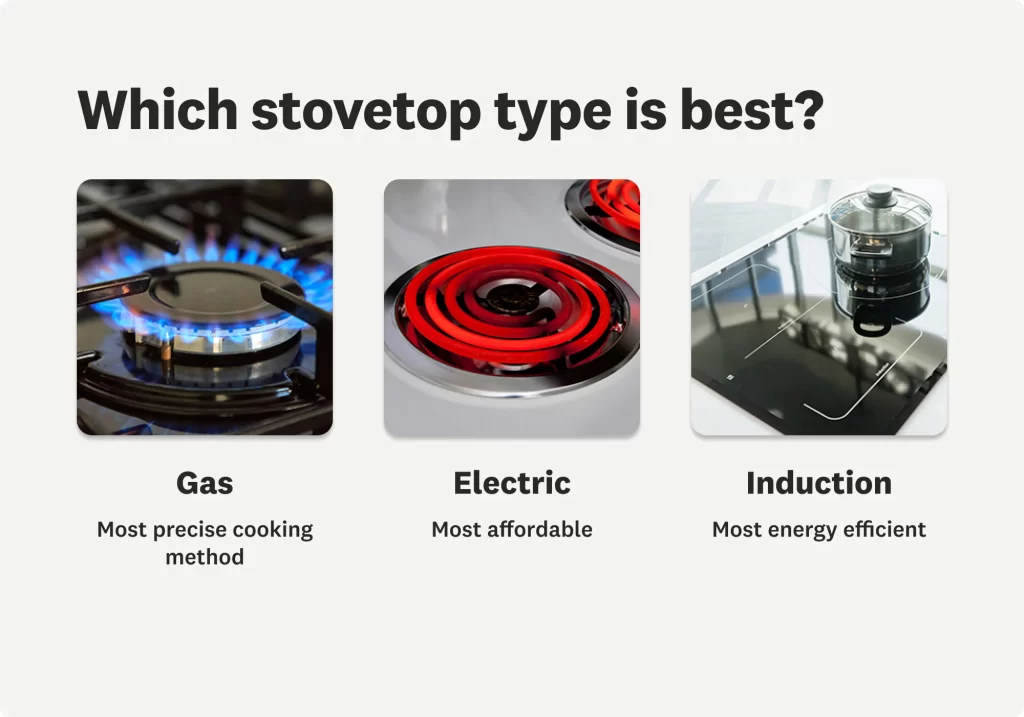
Induction Cooking Efficiency vs. Smooth-Top Electric Ranges
Induction cooktops are generally more energy efficient than smooth-top electric ranges.
Here’s a breakdown:
- Induction: These cooktops use electromagnetic induction to directly heat the cookware, resulting in minimal heat loss. They’re typically around 84% efficient.
- Smooth-top electric: These ranges use resistance heating, which can lead to heat loss. They’re usually around 74% efficient.
Key benefits of induction cooktops:
- Faster cooking: Induction cooktops heat up quickly, reducing cooking times and energy consumption.
- Precise temperature control: They offer more precise temperature control, preventing overcooking and energy waste.
- Safer: The cooktop surface remains cool to the touch, reducing the risk of accidental burns.
Due to their faster and more precise heating process, induction cooktops can result in energy savings. While the difference might not be significant, their 5-10% efficiency advantage over electric smoothtops can contribute to lower energy bills.
How Much Energy Can You Save with an Induction Cooktop?
Induction cooktops can save you up to 10% on your energy bill compared to traditional electric smoothtop ranges. Studies indicate that induction cooking utilizes 90% of its energy efficiently, compared to around 55% for gas cooking and 65% for electric cooking. As the most energy-efficient option, induction cooktops also generate fewer greenhouse gas emissions.
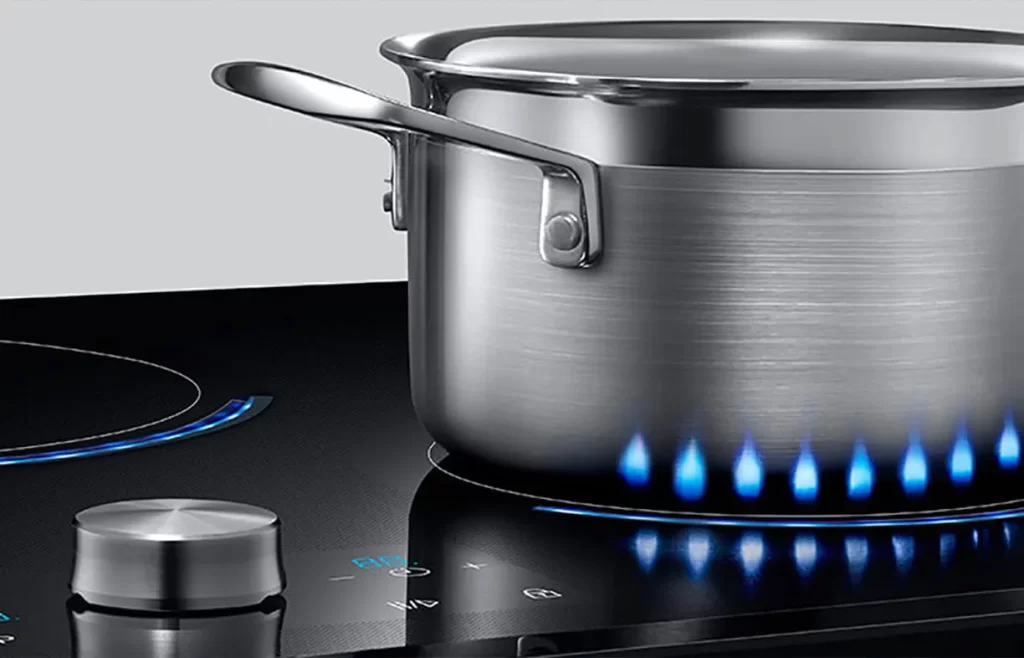
Which is Cheaper to Run: Gas or Induction?
Whether gas or induction is cheaper depends on local energy rates. Induction cooktops are generally more energy efficient, but gas prices can be lower in some regions. Calculating the costs is best based on your specific energy rates and usage patterns.
In total, it depends. Induction cooktops are highly efficient at producing heat, converting electricity into heat in the pan with an efficiency of around 70%. Gas stoves, on the other hand, are generally around 45% efficient, depending on the burner and pan used.
Factors Affecting Energy Efficiency in Induction Cooking
Do Induction Cooktops Use More Electricity?
No, induction cooktops actually use less electricity than traditional electric or gas stoves. They are more energy-efficient due to their direct heating method, which minimizes heat loss.This can lead to lower energy costs and a smaller carbon footprint.
Comparing Cooking Times: Is Induction Cooking Faster?
Yes, induction cooking is generally faster than traditional electric or gas cooking. This is because induction cooktops heat up quickly and can precisely control the temperature, allowing for faster cooking times without overcooking.
Induction cooking is the most precise technology available today, offering faster cooking times than traditional stoves while being equally powerful. Unlike traditional stoves that rely on an open flame or electric coils to heat pans, induction cooking uses electromagnetism to heat the pan directly.
Comparing Cooking Times
| Task | Gas Cooktop Time | Electric Cooktop Time | Induction Cooktop Time |
| Boiling 2 liters of water | 8 minutes | 6 minutes | 3 minutes |
| Sautéing vegetables | 10 minutes | 8 minutes | 5 minutes |
| Heating a pan for searing | 3 minutes | 2.5 minutes | 1 minute |
How to Make Induction Cooking Even More Energy Efficient
Here are some tips to make your induction cooking even more energy efficient:
- Use compatible cookware: Ensure your cookware is specifically designed for induction cooking. Look for markings like “induction compatible.”
- Match pan size to burner: Use a pan that’s the same size or slightly smaller than the burner to minimize heat loss.
- Cover pots and pans: Covering your cookware can significantly reduce cooking time and energy consumption.
- Adjust heat settings: Once your food is boiling, reduce the heat to a simmer or low setting to maintain the desired temperature.
- Turn off the cooktop early: Turn off the cooktop a few minutes before the food is finished cooking to allow residual heat to finish cooking.
- Consider a timer: Using a timer can help you avoid leaving the cooktop on for longer than necessary.
By following these tips, you can further optimize the energy efficiency of your induction cooktop and reduce your energy bills.
Related Articles:
Comparing Electric Cooktop Brands Latest Article 2024
Is A 3500W Induction Burner An Overkill? Latest Info 2024
Which Induction Cooking Temperature is preferable? Info 2024
Why Do Induction Stoves Make Those Annoying Clicks? 2024
Conclusion
In conclusion, induction cooktops stand out as a highly energy-efficient and innovative solution for modern kitchens. By utilizing electromagnetic technology, they deliver faster cooking times, precise temperature control, and reduced energy consumption compared to gas and traditional electric stoves. This translates into lower utility bills, a smaller carbon footprint, and enhanced kitchen safety. With the right cookware and cooking practices, you can maximize the efficiency and benefits of this advanced cooking method, making it a smart choice for a sustainable and convenient cooking experience.
FAQs
Does induction cooking work with all cookware?
No, induction cooktops require magnetic cookware. If a magnet sticks to the bottom, it will work on induction.
Are induction cooktops more expensive to repair?
Yes, they can be, but with proper care and maintenance, repairs are rare.
Do induction cooktops use more electricity than gas stoves?
While they use electricity instead of gas, they are much more energy-efficient, so overall usage is lower.
Can induction cooktops reduce indoor air pollution?
Since they don’t burn gas, they don’t produce carbon monoxide or nitrogen dioxide inside your home.

